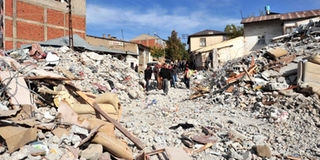Desperate hunt for survivors after Turkey quake

People scramble through the rubble, one day after the 7.2 magnitude earthquake struck in the Ercis province of Van, in eastern Turkey, on October 24, 2011. Hopes faded October 25, 2011 of finding more survivors as rescuers under floodlights scrabbled desperately through the rubble of an earthquake that killed at least 279 people in eastern Turkey AFP
Hopes faded Tuesday of finding more survivors as rescuers under floodlights scrabbled desperately through the rubble of an earthquake that killed at least 279 people in eastern Turkey.
The rescue workers scrambled to find survivors as residents spent a second night outside in the freezing cold.
"I am still trembling (because of fear)... As long as those aftershocks go on, we will stay in the street," Gulizar, a Kurdish woman in her 40s, told AFP as she tried to keep warm in front of a makeshift fire in Van city centre.
With night-time temperatures expected to dip to two degrees Celsius (36 Fahrenheit) and snow forecast for Wednesday, residents took shelter anyway they could -- some in cars, some in tents and some under only a blanket.
Hundreds of rescue workers frantically scrambled to pull any survivors out of the rubble in the town of Ercis, which received the brunt of the quake, as scores of ambulances and medical supplies were rushed to the area from around the country.
The confirmed death toll from the 7.2 magnitude earthquake which struck around lunchtime on Sunday in Van province stood at 279 with some 1,300 people injured, according to Deputy Prime Minister Bulent Arinc.
After the quake hit, people living in the eastern province issued cries for help on Twitter, giving out the addresses of collapsed buildings and the number of people trapped under the debris.
"We couldn't understand what was going on -- all of a sudden there was dust everywhere, our eyes were full of dust, and we were thrown against the walls and furniture. It lasted 20 seconds," said 23-year-old Ercis resident Yunus Ozmen as he recounted the moment disaster struck.
In Van city, the desperately sad and pleading eyes of a 34-year-old man whose nine-month-old nephew was lying beneath piles of rubble spoke volumes. "We recovered his baby bed," he said.
"God willing we will find him alive too," he said, without diverting his eyes from the scene where rescue operations continued nonstop for two days. The man said his brother, the baby's father, was also under the collapsed building.
Rescuers combing through the rubble faced a grim task interspersed with occasional "miracles" like 16-year-old girl Hilal being pulled smiling from the rubble of her house, and two children plucked alive from a collapsed building.
"In one hour, it's the seventh miracle that we have saved, including a one-year-old baby," said a medical worker at the Ercis stadium, which has been transformed into a field hospital, as he brought in an elderly survivor.
But, with each hour that passes the chances of more miracles diminishes.
"Tomorrow, it will no doubt be the end of hope," he added.
Some 169 people were killed in Ercis, while 95 died in Van city centre, the Anatolia news agency reported. A total of 970 buildings collapsed as a result of the quake and aftershocks, including a dormitory in Ercis under which many students were believed to be buried.
"Our house was badly damaged. We will live like this maybe for one or two weeks," said 34-year-old Zuleyha, who was staying in her car with her husband and five-year-old son.
The football pitch in the town of Ercis has been transformed into a sea of tents set up by the Red Crescent, a field hospital was erected in its stadium and some 1,500 units of blood have been sent to the region.
Some 2,400 search and rescue teams from 45 cities and more than 200 ambulances have rushed to the region, according to the government.
The military said six battalions were also involved in search and rescue efforts and that six helicopters, including four helicopter ambulances, as well as C-130 military cargo planes were dispatched to the area carrying tents, food and medicine.
Arinc said 10 countries had offered to send search and rescue teams but the government had declined the offers for now.
Only nine percent of buildings in Van province had compulsory earthquake insurance, according to Selamet Yazici, the general manager of the natural disaster insurance institution.
The Turkish Red Crescent sent some 7,500 tents, more than 22,000 blankets, almost 4,000 heaters and 1,000 body bags to the region. A mobile bakery and 21 mobile kitchens were also sent to Van.
Iran, which felt the tremor as well in its northwestern cities, had sent rescuers and equipment.
Greek Prime Minister George Papandreou on Monday said his country "stands ready" to help and Prime Minister Benjamin Netanyahu of Israel, with whom relations have become frosty over the past year, telephoned Erdogan to tell him that Israel "is ready to help Turkey in this painful time," Anatolia reported.
In 1999, two strong quakes in northwest Turkey's heavily populated and industrialised regions left some 20,000 dead. A powerful earthquake in the town of Caldiran in Van province killed 3,840 people in 1976.




